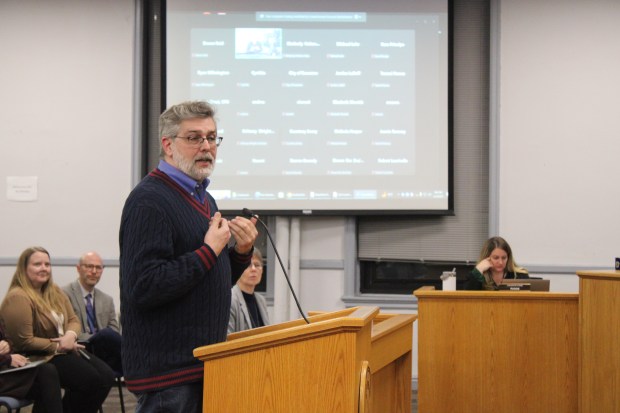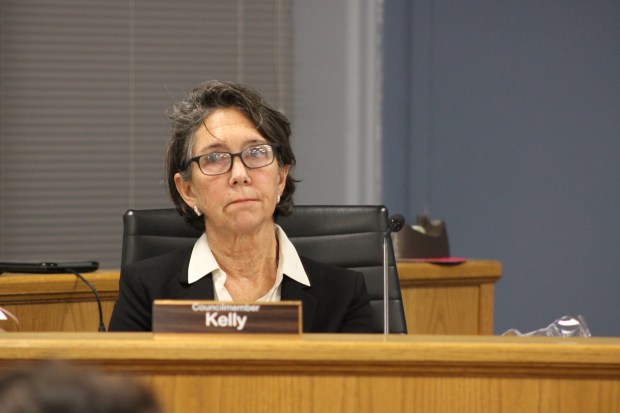A sometimes-contentious Evanston City Council meeting Jan. 13 ended in delaying the timeline to fully implement Envision Evanston 2045, the city’s proposed comprehensive plan, and update the city’s zoning code.
Taken together, the measures would increase density in some parts of Evanston, for example allowing more residents to live near public transit, which could help ease climate change, and more to live near shopping districts, potentially providing customers for businesses. But critics have worried the measures could reduce real estate property values.
Much of the controversy was sparked, in part, by a proposed rezoning of Evanston’s residential areas. At the City Council meeting Jan. 13, First Ward Alderwoman Clare Kelly proposed stalling the city’s scheduled implementation of the comprehensive plan by “(eliminating) any real or perceived timeline” for Envision Evanston.
After about 100 public commenters spoke, which took about two hours, the city council debated the subject for an additional two hours.
“It reminds me, dare I say, of Ryan Field,” said Second Ward Alderwoman Krissie Harris, referring to the extent of public engagement.
Ultimately, the city passed a motion to separate the city’s comprehensive plan and zoning code to give them their own timelines, as well as separate consideration from the Land Use Commission and City Council. The city’s Land Use Commission was tasked with giving a final recommendation on Envision Evanston to the City Council by March and to give a final recommendation on the zoning code by the end of August.
Mayor Daniel Biss, a supporter of Envision Evanston who is up for election on the April 1 ballot, told Pioneer Press in a December interview that his administration’s goal was to enact Envision Evanston during his first term as mayor. His opinion on the matter changed after getting more feedback.
“I would never support moving forward with something that isn’t ready,” Biss told Pioneer Press. “What’s become clear is that we weren’t going to be able to finish the zoning code in March, while also meeting all of our expectations for the product and the process.”
Kelly, who is also up for re-election, told Pioneer Press the delay was a “partial victory” for Evanston residents.
“Getting the zoning rewrite off the runaway train means there is now hope… sometimes you have to step back to move forward,” she said.
Kelly was the sole City Council member to accuse Envision Evanston of being used as a political tool. “Absent of an election, there would be no urgent deadline,” she said.
Biss disagreed with that assessment. “What seems to me the political thing is to avoid doing hard things before the election, but I don’t believe in that. I believe in doing this right,” he said.
When asked by Pioneer Press if her timing of objecting to the timeline for Envision Evanston months before the election is a political act in itself, given that the city has been pursuing it since 2023, Kelly said, “Taking time to do something the right and responsible way is in the interest of residents.”
Kelly filed a motion to further delay the vote on Envision Evanston until the summer and the zoning code update to next year, but did not have enough votes to pass it.

Evanston Land Use Commission Chair Matt Rodgers said the delay in the timeline is a result of the commission’s incomplete assessment of the zoning code and Envision Evanston caused by the city’s consultant hired to assist the city with implementing both.
“We’re still working on the initial draft, with an outline of chapters that are missing, as well as some bullet points on things that are going to be added over time,” Rodgers said of both plans.
City staff were adamant in trying to conserve the existing timeline for the implementation of Envision Evanston. “I think we lose momentum if we pause for a month, and we also run the risk of folks not necessarily coming back to the table,” said Planning Manager Elizabeth Williams.
Eighth Ward Alderman Devon Reid asked Williams questions on both Envision Evanston and the zoning code.
Williams said residential areas that are of the lowest density in Evanston, or single family homes, would not, under the proposed zoning update, have the same zoning as areas of Evanston that contain high rises. Areas of Evanston that have single family homes would have a height restriction of 35 feet, which is what the code currently allows, but increases the number of floors from 2.5 to 3, she said.
When asked by Reid, Williams said under American Planning Association standards, municipalities should seek to engage about 1% to 2% of their populations when pursuing a comprehensive plan. By Evanston’s metrics, over 4,000 have participated in the process, greater than 5% of Evanston’s population, according to Biss, who is also a mathematician.
Resident feedback for Envision Evanston was mixed. About 30 residents advocated for the comprehensive plan to be delayed and about 15 advocated for the then-existing timeline to remain.
The city’s Land Use Commission was anticipated to continue the topic of Envision Evanston at its Jan.15 meeting.



